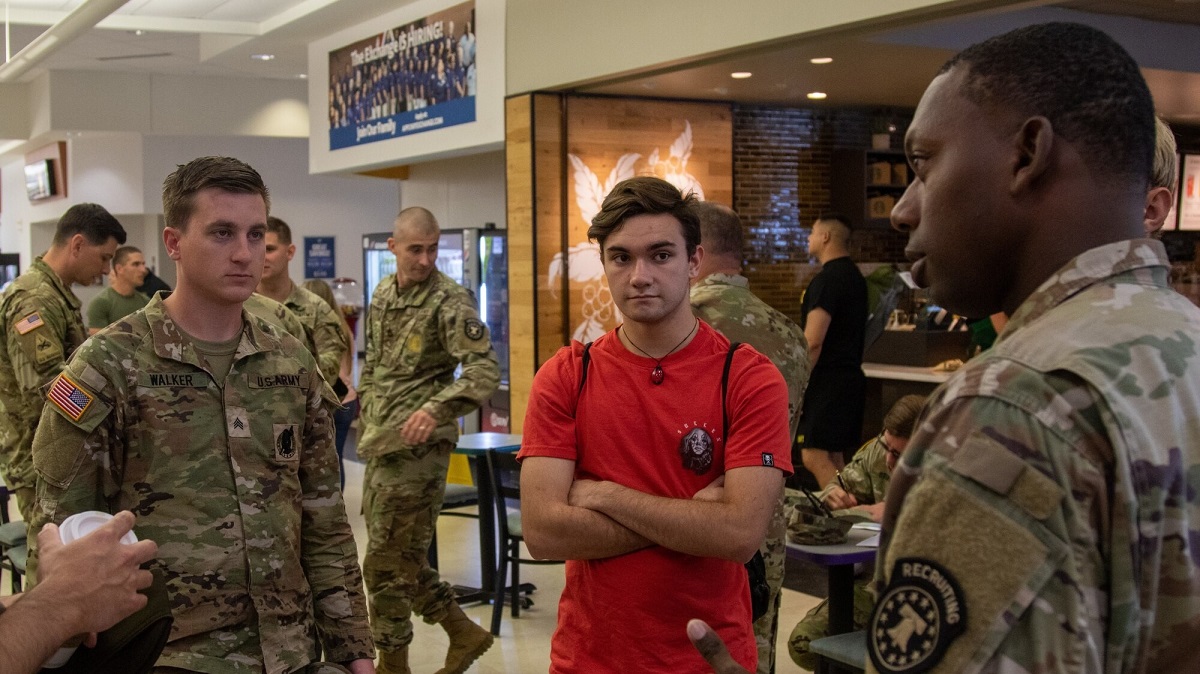
Fifty years ago, the United States Department of Defense ended the draft and chose to rely exclusively on volunteers to fill the ranks. The all-volunteer force was born and the competition was on to attract the best and brightest to military service. This year, the Army, Navy and Air Force, including National Guard components, all expect to fall well short of their recruiting goals. Tony Perez feels that one of the major shortcomings of the recruiting game is communication. He’s in the studio with podcast editor Ron Granieri to explain why a significant portion of the problem is old people failing to communicate with young people. Old people may be a bit of an overstatement, but Tony sees an issue with the inability of military recruiters to explain why the military provides so many of the things that the next generation desires in a job or even a career.
If somebody’s offering me that much money. How bad is it really in the service? You communicate things and you signal ideas with the type of incentives that you offer.
Podcast: Download
Antonio Perez is a field artillery officer and a lieutenant colonel in the U.S. Army. He is a graduate of the AY23 Resident Course at the U.S. Army War College and the Director, U.S. Army Fire Support Test Directorate.
Ron Granieri is Professor of History and the Chair of the Department of National Security and Strategy at the U.S. Army War College and the Editor of A BETTER PEACE.
The views expressed in this presentation are those of the speakers and do not necessarily reflect those of the U.S. Army War College, U.S. Army, or Department of Defense.
Photo Description: Dozens of new Army recruits and prospects from all over New York, Pennsylvania and New England, visited Fort Drum on Aug. 31 to meet with 10th Mountain Division (LI) personnel, tour facilities and learn more about the Army.
Photo Credit: Pfc. Samuel Bonney, 27th Public Affairs Detachment





If Millennials, Gen Z and Gen A need to be inspired — for example as to an overarching “cause” (and, indeed, possibly a generational “cause”) — a “cause,” thus, that might help to motivate these folks to join and serve — first in the U.S. Armed Forces — and later elsewhere (but, again, as per this such overarching and generational “cause”),
The let’s be bold enough to suggest such a “cause;” for example, the mission to transform the states and societies of the world (to include our own states and societies here in the U.S./the West); this, so that same might provide a better life for the people of the world as a whole.
From this such perspective, this is not so much “national service” — or service in support of one’s own nation only — but “international” service — service in support of the world as a whole.
Bottom Line:
If Millennials, Gen Z and Gen A consider themselves be “citizens of the world” — and, thus, are seriously concerned with issues relating more to the world as a whole (exs: climate change; social issues)
“Global protests in support of social justice during the past few months, like rallies decrying climate change that preceded them, remind us that younger generations consider social purpose to be a personal calling and gladly embrace the role of change agents on a range of issues.” (See the Sep 16, 2020 Forbes “Leadership” article “Millennials And Gen Z’s Are Shaping A Better World For Us All.”
Then these Millennials, Gen Z and Gen A may also be inspired — consistent with their such “citizen of the world” role, goals and ambitions — to join with a U.S. military that has similar “world”-related goals, missions and responsibilities?
Addendum to my comment immediately above:
Thus, if there is a “generational gap” and/or a “communication gap” to be overcome today, then these such “gaps” would seem to be that our young people do not realize that (a) the U.S. military’s mission post-the Old Cold War, this has been (and still is?) (b) directly related to “providing a better life for the people of the world as a whole?”
(Thus, as a “citizen of the world,” you should be prepared to take on the duties and responsibilities (for example U.S. military service and/or other U.S./Western “whole of government and society” efforts and responsibilities) which are consistent with being a “citizen of the world.”)
As to our problems relating to recruiting today (suggested as the “generational gap” and the “communication gap”), let us consider — first as related to the “generational gap” — that this is caused by the fact that:
a. In the Old Cold War era, the now-older generation of Americans were — in one way or another — involved in U.S./Western strategies of “containment” and “roll back;” that is, (a) involved in ANTI-CHANGE strategies and related activities which were (b) designed to PREVENT the transformation of the states and societies of the world (those both here at home and there abroad) more along Soviet/communist political, economic, social and value lines. And by the fact that:
b. In the post-Cold War era, the now-younger generation of Americans have been — in one way or another — involved in U.S./Western strategies of “transformation;” that is, (a) involved in PRO-CHANGE strategies and related activities which were (b) designed to ACHIEVE the transformation of the states and societies of the world (those both here at home and there abroad); this, more along political, economic, social and value lines which are more supportive of — and thus more benefiting from — such things as capitalism, trade, globalization and the global economy. (Thus, my “providing at better life for the people of the world as a whole” political objective suggestions in my initial comments above.)
(Thus, to better understand the “generational gap” suggestion?)
Next, as per the suggested “communication gap,” let us consider that this is caused by the fact that our young people — for some reason or another (bad communication on our part?) — do not understand that the U.S. military, post-the Old Cold War — and much like many other U.S./Western “whole of government and society” organizations — has been DIRECTLY INVOLVED in these such “transformative”/these such “achieve a better life for the people of the world as a whole” activities. (Indeed, one might say that the U.S. military — both by way of its example and by way of its activities throughout the world — has been “the tip of the spear”/”the vanguard” of these such “transformative”/these such “achieve a better life for the people of the world as a whole” endeavors?)
(Thus, to better understand the “communication gap” suggestion?)
Conclusion:
Based on the information that I provide above — as relates to both the thus explained “generational gap” and “communication gap” — what steps might we take to both (a) cause the older generation to come over to our “contemporary strategic purpose” side and to (b) cause the younger generation to understand that we are, in fact, on the exact same “change agent” (see the Forbes quote at my initial comment above) team as they are?
One might note that, in my comments above, I have pretty much abandoned — and thus do not discuss or work hard to achieve — the gaining of recruits from that portion of the younger population who are at cross-purposes with our contemporary “transformative” strategic objectives today.
In this regard, is it likely — back in our Old Cold War days — that we pretty much abandoned — and thus did not discuss or work hard to achieve — the gaining of recruits from that portion of the younger population who were at cross-purposes with our “containment” and “roll back” strategic purposes back then?